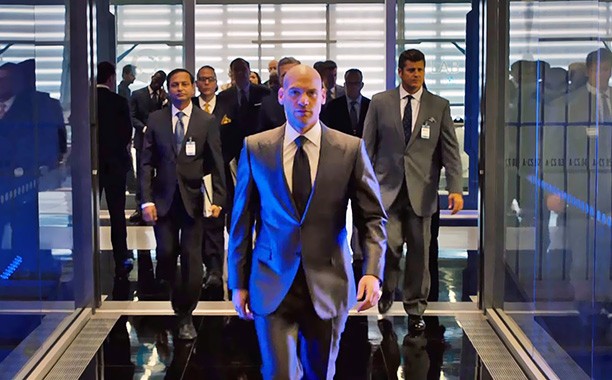
Corey Stoll has been acting in films for about 10 years, but it was his turn as Ernest Hemingway in MIDNIGHT IN PARIS a few years ago that truly brought his talent to our attention. Soon after, he followed that up with his terrific, Golden Globe-nominated turn as Rep. Peter Russo on HOUSE OF CARDS, and has been regularly popping up in supporting roles in stuff like NON-STOP, THE GOOD LIE, and THIS IS WHERE I LEAVE YOU ever since.
This is a big summer for him: aside from his splashy mainstream gigs in ANT-MAN and THE STRAIN (which we discuss below), he’s got his debut as a big-screen leading man coming out, GLASS CHIN. In it, he plays a retired boxer who is penniless and down in the dumps, despite his former talent. He gets two opportunities to get something going for himself, one cooked, one legit, and he quickly finds himself having to make moral decisions that don’t really leave him looking too good either way. The film is carried on Stoll’s shoulders and he’s in every scene. Unsurprisingly, he can not only handle holding down the film, but he makes it look effortless.
There was a bunch of stuff I wanted to ask Stoll about, but I feel like we got to most of it, including his experiences on GLASS CHIN, his role in MIDNIGHT IN PARIS, and what it was like to play the villain in a big-budget superhero movie:
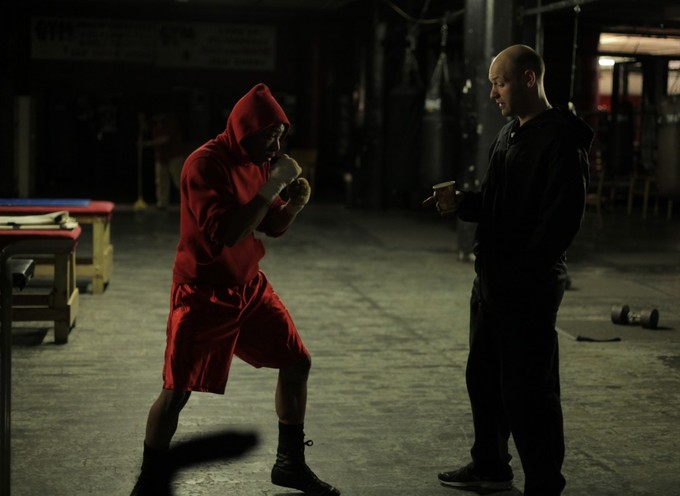
VINYARD: First off, obviously you play a boxer in the movie. Did you ever have any experience boxing or anything like that?
STOLL: Just a few classes. I did a little bit of training before I played Ernest Hemingway a few years ago just to get a sense of that, then a little bit for this. Even though I don’t do any boxing in the movie, I wanted to get a little bit of sense of… the sights and sounds and smells of the gym. Malcolm Xavier, who plays Kid Sunshine, and I went to Gleason’s Gym in Brooklyn and spent some time training together. That was really essential, just to get a sense of both what that world is like and to bond with Malcolm a little bit.
VINYARD: What was it that pulled you to the script, was it Noah Buschel? Were you familiar with his work, or was it just based on the script itself?
STOLL: At first, it was just the script. I had seen THE MISSING PERSON. But I think when I’d read the script, I didn’t put two and two together, and I just read the script pretty much cold. It’s so well-written, and it’s so funny and moving. It’s playing with these cliches and tropes of noir and pulp movies, but there’s a real person there, and the stakes are real, the journey that Bud goes through is real. It didn’t take much convincing to get me to do it.
VINYARD: You’re in every scene of the film, so I’d imagine you worked with (Buschel) really closely. What was that relationship like?
STOLL: It was pretty no-nonsense in terms of the directing. On set…he set up the shot, and we did the scene, and his notes were pretty minimal. I think he believes strongly in that cliche that 90% of directing is casting. There would be moments of saying, “Add a gesture,” “Put your hood up in the scene,” but for such a young director, he really had an incredibly confident stand.
VINYARD: That’s great to hear, because you started out on the stage, and a lot of this movie is told in long, drawn-out takes, so he was obviously very trusting to let you figure it out on your own.
STOLL: Yeah, it was great. And he so brilliantly cast the movie. Everybody has significant theater chops. That was really essential, because you’re not going to have an editor come in and clean up your mess. The audience is catching everything you’re doing, and there really is no safety net. It’s really hard work, both in the sense of wanting to create a dynamic, exciting scene but without appearing like you’re acting. That’s a tough needle to thread.
But also, there’s this one scene at the end where Billy Crudup gives this three-page monologue, and there’s basically a whole other scene after that. I come through the door, I’m in my apartment, then I see that Billy’s there. I make him some tea, I sit down, and the camera very, very slowly, over a minute or two, dollies in on a close-up on Billy. It pulls back just as slowly, then he leaves, I’m there by myself. Marin Ireland’s character comes in, we go to the shower, and if during any of that, I were to break, or forget my line, or mess up in some way, I’d be messing up a lot of other people’s work. You definitely had to sort of bring a lot of focus and care to every scene.
VINYARD: You get a lot of rehearsal time? How much time did you have to work out the blocking?
STOLL: Even though we were shooting quickly, often ten pages a day, because there were so few setups, it actually gave us a fair amount of time. Once we got on set, we really had as much time as we needed. But a lot of it was really about the moment. I felt the script was so strong, and my acting partners were so strong, that we could sort of rehearse on camera, and let the camera sort of capture that.
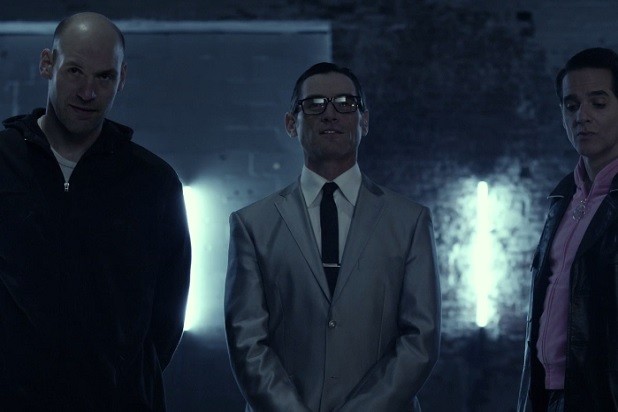
VINYARD: I think the co-star you spend the most time with in the movie is Marin Ireland, as your character’s girlfriend. There’s a lot of intimate dialogue scenes between you. How did you guys establish that sort of crucial familiarity?
STOLL: We’ve known each other for a while. We did a play together, and I knew then that we worked together really well. I’ve been watching all of her incredible work since, so there is a definite mutual respect, and we were really excited to be working together. It didn’t take an enormous amount of thinking or working to achieve that, to click, which was fortunate.
VINYARD: Your other co-star is Silly The Dog.
STOLL: He was a terrible actor! He really was. He was a puppy, and the cutest actor in the world, the cutest dog in the world, but he was not…he was not into following direction, so we definitely had to adjust some of those scenes to his skill level.
VINYARD: There’s one shot where you call for him and he doesn’t show up right away, and I kinda thought “That’s just a dog being a dog.”
STOLL: (laughs) It is, it is just a dog being a dog. This is one moment- you know how actors are always praising their co-stars- but this is a moment where I can say that I think he should not quit his day job.
VINYARD: Hopefully he doesn’t have Twitter. You’re originally from New York, right?
STOLL: Yeah.
VINYARD: Obviously, this movie was shot in and around New York and Jersey. Was it nice to be able to hang out in the hometown?
STOLL: It’s the best. New York is the best place to shoot in the world.
VINYARD: There were never any problems?
STOLL: Oh yeah, it’s a total pain in the ass to shoot in New York! But what you get…there’s just so much richness, and so much variety. There’s no other place in the world that has locations as varied and as interesting as New York, and no place in the world has a population of actors as interesting.
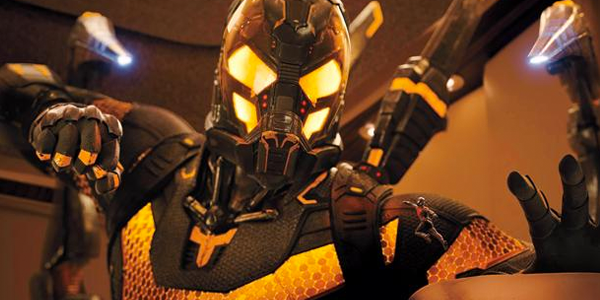
VINYARD: I’m gonna switch over to ANT-MAN for a second. You got it coming out in a month. Have you seen it yet?
STOLL: I have not. I don’t think any of us have. I don’t even think Paul has.
VINYARD: Is it finished?
STOLL: Umm…I’m not sure (laughs)
VINYARD: Was that freaky for you, to take on Yellowjacket, someone that comic fans love?
STOLL: I mean, we’ll see, but I feel like I get a little bit of a pass because…
VINYARD: It’s different.
STOLL: He’s new. There is an alter-ego of Hank Pym that was called Yellowjacket in the comic books, but this is not that. There is a Darren Cross in the comic books, but this is clearly a different character. It’s original. I didn’t feel…it’s not like taking up the mantle of The Joker, or Batman, or whatever. I think there’s leeway. Definitely all the conversations we had about the character were about creating this new character from the ground up.
VINYARD: As a production experience, it’s probably night and day from something like GLASS CHIN. How did you feel working on a kinda massive comic book movie like that, and would you want to do it again?
STOLL: Yeah! I really had a fantastic experience. I was actually kinda surprised. I was prepared for this to be difficult, and to feel like a cog in a machine. In the end, yes, it is a machine, and it’s enormous. But I was really given a seat at the table, and I really felt like a collaborator in a pretty incredible way. Even though the budget for my costumes cost more than the production budget for GLASS CHIN, I still felt like while we were working, it was about the work and it wasn’t about the merchandising and the toys, you know? It was really about what’s happening moment to moment in the scene.
VINYARD: Were you cast when Edgar Wright was still on?
STOLL: Yeah, yeah. He cast me.
VINYARD: Jumping back to GLASS CHIN for a second. You mentioned that it fell into a kind of pulpy, noir-type genre that you responded to. Do you have a particular affinity for stuff like that, and ON THE WATERFRONT, which obviously has a couple of overlaps with the film?
STOLL: Totally. What the movie is doing is playing with those cliches and that world. ON THE WATERFRONT is a great movie, and I love all these sort of noir, pulpy movies. I think, and I don’t want to step on Noah’s toes on this, but it sort of uses that world as a backdrop as an excuse to tell this more allegorical story. The boxing world is a world where you can tell these stories of good and evil, and rich and poor, and authentic and fake on this sort of mythological scale. The dialogue is all really heightened, and people speak on a poetic way, but it’s not satire, and it’s not strictly meta. The stakes are very real, and these characters follow a very human path.
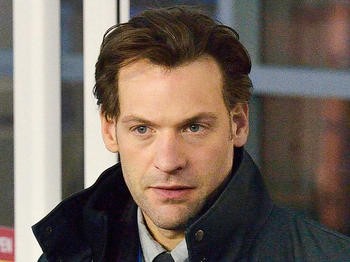
VINYARD: Last question: this was the second thing I’d ever seen with you as the lead, and the first thing was THE STRAIN. You got the second season of that coming up. Anything we should expect from Ephraim in Season Two?
STOLL: The whole series gets into a bigger scale. We see a lot of flashbacks, so the scale expands thousands of years and thousands of miles. As for Ephraim, he’s no longer in that position of that skeptic who’s just saying, “There’s no such thing as vampires.” Which was an important function for my character to perform in the first season. We’re sorta over that, and New York is very clearly infested with vampires, so we’re taking that as a given from the beginning, and moving on from there.
VINYARD: Cool. One quick question: you mentioned that you boxed a little bit to prep for MIDNIGHT IN PARIS. Can you talk a little bit about what you did to prepare to play Hemingway in that movie?
STOLL: Some of those boxing lessons, and reading his words, and reading his words out loud. That portrayal, as Woody Allen wanted it to be, was not about the real person, but the voice that one imagines while reading. The only way to really imagine what that voice was was to read, which was a really joyful experience, to gorge on Hemingway.
VINYARD: Well that one really blew me away, man, just to tell you.
STOLL: Thank you.
GLASS CHIN opens tomorrow, and you can catch ANT-MAN and Season Two of THE STRAIN on July 17th and July 12th, respectively.
